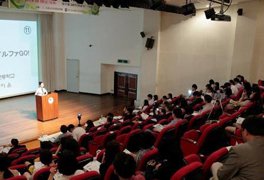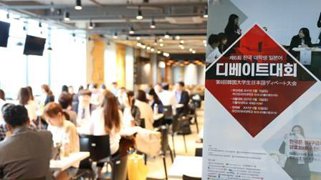Challenging Oneself While Eyeing Japan, Which Is Visible Across the Sea!
The Japan Foundation, Seoul
NAKANO Yuri
Busan, the Korean City that Feels Closer to Japan Than to Seoul
There are around 556,000 Japanese-language learners in Korea (according to The Japan Foundation’s “Survey on Japanese-Language Education Abroad 2015”), meaning Korea ranks third in the world for the number of people studying Japanese. However, the number of learners in the survey is simply “the number of people who were studying Japanese at educational institutions at the time.” According to the results of a joint survey undertaken by The Japan Foundation and Dentsu Inc. and released in December 2016, the number of people “learning Japanese using some method or other,” which includes media-based self-learning and so on, is estimated to be an incredible 5 million or more (1). According to that survey, “If three Koreans get together, the probability that one of them will be able to speak at least a little Japanese is around 80%.” Among people who have visited Korea, many would no doubt also agree with these survey results.
Even within Korea, one region in particular that has had active exchanges with Japan since long ago, and which is also close to Japan geographically, is the Yeongnam region (the region made up of southeast Korea’s Gyeongsang Province and the three metropolitan cities of Busan, Daegu, and Ulsan). For the people of Busan, in some cases it is easier and more convenient to travel to Japan by LCC or high-speed ferry than to travel to Korea’s capital city of Seoul by high-speed rail. The number of Japanese-language learners is said to be falling in Korea, but based on my time living in Korea and particularly in Busan, I feel there are still more than a few people learning Japanese for travel, as a hobby, or for business purposes.
Young People in the Yeongnam Region Will not Be Outdone When It Comes To Japanese-Language Skills
Attesting to the large number of Japanese-language learners in the Yeongnam region is the variety and high level of Japanese language-related contests there. One of the important duties of Japanese-Language Specialists dispatched to Busan is judging these various types of contests. The contests that Japanese-Language Specialists were involved in judging in 2017 varied, from contests held within schools to ones held on a national scale. They included:
May: A Japanese recitation contest at a certain high school and a Japanese speech contest at a certain university
June: A Japanese speech contest for high school students in the Yeongnam region, a national Japanese presentation contest for university students, and a J-Pop contest at a certain high school
September: A Japanese drama festival for university students in the Yeongnam region, a Japanese debating contest for university students (Busan contest) and a Japanese debating contest for university students (national cup)
November: A national Japanese speech contest for university students, and a Japanese speech contest at a certain high school
In addition to these events, annual events are also held that Japanese-Language Specialists are not involved in judging, such as a “Japanese Song Contest” and a “Japanese Quiz Contest for High School Students.”

A Japanese Speech Contest for High School Students
In all cases the judging is something we Japanese-Language Specialists grapple with, but even within that, the contest that really tests us as judges is the “Japanese Debating Contest for University Students.”
This contest was held for the sixth time this year. It is a competitive debate in which Korean university students take different positions on a certain topic and debate it in Japanese, a foreign language to them. In order to debate well, they need not only Japanese-language ability but also the ability to analyze information, the ability to think critically, the ability to explain things logically, the ability to resolve problems promptly, and furthermore the ability to cooperate in order to engage in the debate as a team. It is a contest that genuinely tests all the skills said to be needed in modern society.
In my case, I found that even judging two debating sessions in one day was exhausting. However, after the sessions I spent a very enjoyable time chatting to the university students who had participated. There was no end of things to talk about, including how they and their teammates went about preparing up to the day of the contest, the mindsets they adopted when taking part, and their thoughts about the future. This gave me a real sense of how significant just taking part in this contest is for them.

Getting together with participants after the Japanese Debating Contest
In addition to judging various Japanese language-related contests, the job of a Japanese- Language Specialist includes various tasks such as planning and holding teacher training, giving presentations at study meetings, workshops etc., visiting various educational institutions, and supporting Japanese-language lessons. The satisfaction that I get from performing these duties is the result of getting to meet directly with people who are learning Japanese, like I mentioned above, and listening to what sorts of experiences they have had and what they have felt as a result of studying Japanese. I enjoy the sense of expectation I get from catching a glimpse of how those experiences and feelings will influence their futures. Going forward also, I believe my job is to create opportunities for as many people as possible in the Yeongnam region to experience and learn things that will connect to their futures, through the Japanese-language.
(1) “Number of Japanese-language learners in Taiwan, Hong Kong and Korea estimated to be around 8 million (joint survey by The Japan Foundation and Dentsu Inc. announced)”
- What We Do Top
- Arts and Cultural Exchange [Culture]
- Japanese-Language Education Overseas [Language]
- Japanese-Language Education Overseas [Language] Top
- Learn Japanese-language
- Teach Japanese-language
- Take Japanese-Language Test
- Know about Japanese-language education abroad
- The Japanese-Language Institute, Urawa
- The Japanese-Language Institute, Kansai
- Japanese-Language Programs for Foreign Specified Skilled Worker Candidates
- Japanese Language Education for Japanese Children Resident Overseas and for the Descendants of Migrants
- Archives
- Japanese Studies and Global Partnerships [Dialogue]
- JF digital collection
- Other Programs / Programs to Commemorate Exchange Year
- Awards and Prizes
- Publications
